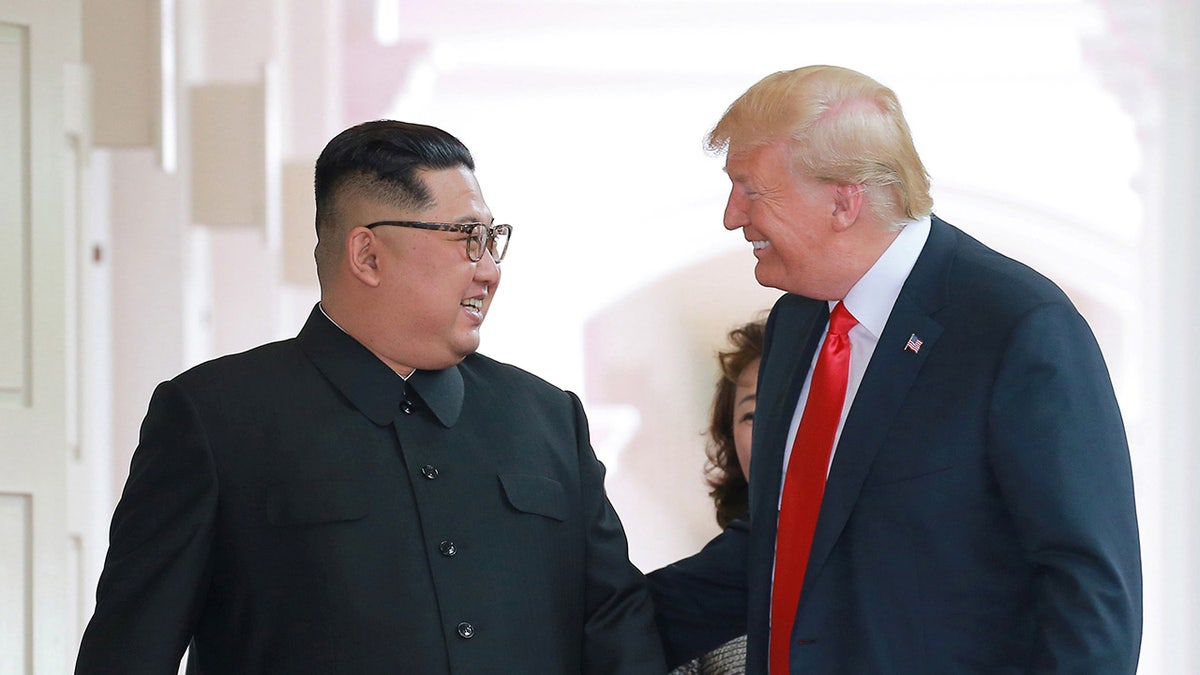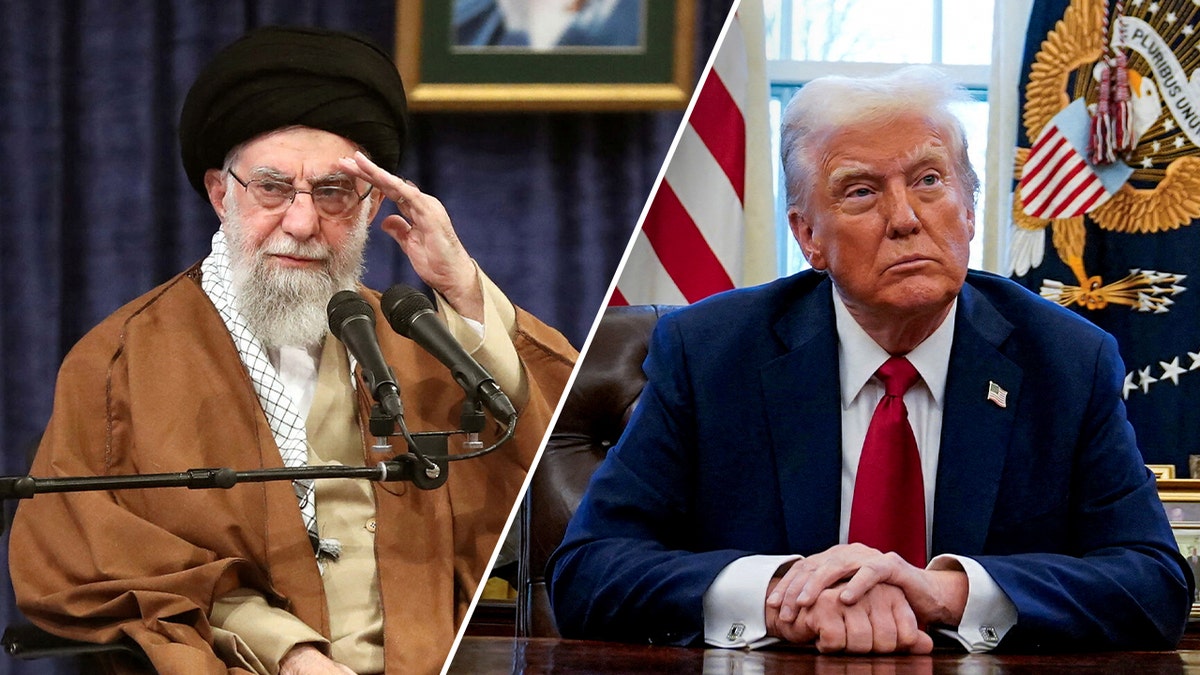
President Donald Trump’s revelation this week that he wants to negotiate with Iran raised eyebrows in the security sector. A former national security advisor cautioned the president against forming a Kim Jong Un-type relationship with the Ayatollah.
Trump has described his relations with Kim as a « love » affair, but his first-term efforts at diplomacy with the hermit kingdom failed to prevent North Korea from advancing its nuclear program.
« On the question of negotiations, we’ll see where this goes, » said John Hannah, former national security advisor to Dick Cheney and current Randi & Charles Wax senior fellow at the Jewish Institute for National Security of America (JINSA).
Hannah spoke Thursday evening during a discussion hosted by JINSA in Washington, D.C., on Trump’s new plans to start negotiations with Iran.
IRAN’S SUPREME LEADER SAYS NUCLEAR TALKS WITH TRUMP ADMIN WOULD NOT BE ‘WISE’

President Donald Trump walks with North Korean leader Kim Jong Un at the Capella Hotel on Sentosa Island in Singapore in a photo released June 12, 2018, by North Korea’s Korean Central News Agency. (KCNA via Reuters )
« Trump and Kim Jong Un — that’s a worst-case [scenario] — he comes out hot and heavy against. He gets engaged and snared in a negotiation. He gets sweet talked to. It’s dragged out for the rest of his presidency, » Hannah said. « And we make absolutely zero progress on dismantling or neutralizing the North Korean nuclear program.
« That’s the nightmare. »
Trump’s decision to pursue negotiations with Iran to dismantle its nuclear program was announced by the president in a post Wednesday night on his Truth Social media platform, when he stated his desire for a « Verified Nuclear Peace Agreement. »
« We should start working on it immediately, and have a big Middle East Celebration when it is signed and completed, » he wrote. « God Bless the Middle East! »
His post came one day after Trump signed an executive order directing the Treasury Department to begin a « maximum pressure » campaign on Iran through sanctions targeting the regime’s oil exports in a move to deter Tehran from continuing its nuclear development.
PRESIDENT TRUMP SAYS ‘WE WILL HAVE RELATIONS WITH NORTH KOREA’; IT’S A ‘BIG ASSET’ THAT HE GETS ALONG WITH KIM
But, after the order, he told reporters he was « torn » about signing the directive and added he was « unhappy to do it. »
The Trump administration has not released details on who will lead these negotiations, how they will differ from the negotiations attempted by the Biden administration or what a new deal would include that wasn’t in the international deal reached during the Obama administration under the Joint Comprehensive Plan of Action (JCPOA). That deal was finalized by the five permanent members of the United Nations Security Council — China, France, Russia, the U.K. and the U.S.
The so-called Iran nuclear deal, which Trump pulled out of in 2018, was also signed onto by Germany and the European Union.

The Foundation for Defense of Democracies has analyzed where Iran’s nuclear infrastructure is located as Israel mulls a retaliatory attack. (Foundation for Defense of Democracies)
Hannah said Trump’s change in tune on securing a nuclear deal with Iran could be a negotiating tactic, though he warned that « 25 years of negotiations with the Iranians on the nuclear program have led nowhere except an Iran right on the cusp of having nuclear weapons. »
The former national security advisor, along with the former special representative for Iran and Venezuela Ambassador Elliott Abrams, together warned that the Trump administration is facing a serious deadline when it comes to taking on negotiations with Iran.
Come October, Russia, a top ally to Iran, will take on the lead role of the United Nations Security Council, filling the presidency for one month, which could pose its own security concerns.
TRUMP REINSTATES ‘MAXIMUM PRESSURE’ CAMPAIGN AGAINST IRAN
But there is another October deadline looming over international attempts to block Iran’s nuclear development. The ability for the nations remaining in the JCPOA to apply « snapback » sanctions on Tehran will expire Oct. 18, 2025.
« There have to be negotiation discussions between Trump and [Israeli Prime Minister Benjamin] Netanyahu on how long are we going to wait to see this negotiation drag on, » Abrams said, referring to the years-long talks by the Biden administration that proved fruitless.
« I’m sure the Iranians will say if you impose snapback [sanctions] the negotiations are over, and we will leave the nuclear nonproliferation treaty. »
Iran, particularly in recent years, has been found to have repeatedly violated the treaty, though proponents of a nuclear deal argue it is a useful tool to keep Tehran involved in nuclear nonproliferation discussions.

Iran’s Supreme Leader Ayatollah Ali Khamenei and President Donald Trump. (Office of the Iranian Supreme Leader/WANA; Handout via Reuters/Elizabeth Frantz/File Photo)
CLICK HERE TO GET THE FOX NEWS APP
But Abrams also warned that the U.S. and Israel should engage in military drills to remind Iran of what it is potentially facing should it move forward with nuclear development.
Retired Israel Defense Forces Major General Yaakov Amidror echoed this sentiment and said he believes it is unlikely that Iran completely ignores the threat of U.S.-Israeli strike force capabilities because it relies on the legitimate aspects of this nuclear program for economic stability.
Iran’s Supreme Leader Ayatollah Ali Khamenei on Friday rejected the possibility of engaging in any future negotiations with the Trump administration.
